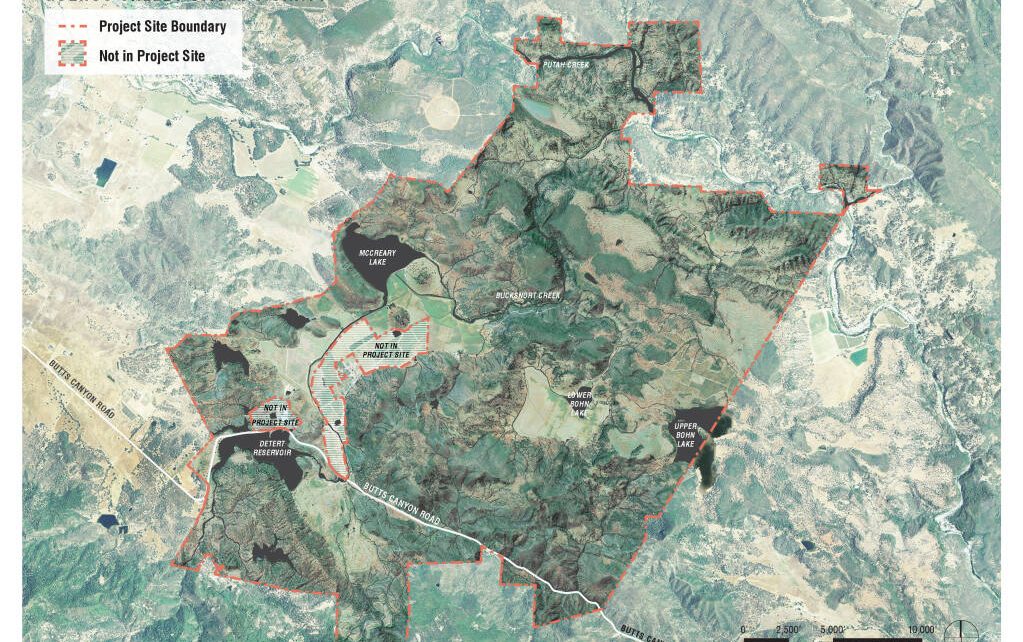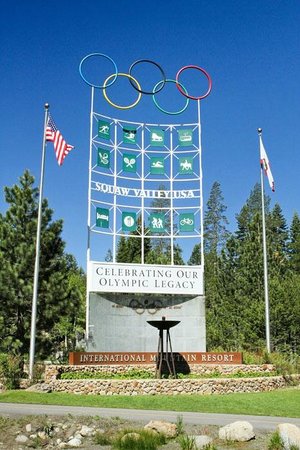
Proposed Guenoc Valley Project. (Photo: Lakecounty.ca.gov)
Proposed Guenoc Valley Luxury Resort Halted By Lake County Judge Over Wildfire Concerns, CEQA Issues
Court ruling stops progress on 25 square mile resort north of the Bay Area
By Evan Symon, January 7, 2022 1:40 pm
Lake County Superior Court Judge J. David Markham ruled earlier this week that development of a large 25-square-mile proposed resort in the Guenoc Valley is to be stopped due to violations of the California Environmental Quality Act (CEQA) by not having adequate wildfire and emergency plans.
In July 2020, the Lake County Board of Supervisors approved of the Guenoc Valley Project, a massive proposed luxury resort of 1,400 villas, five hotels, resort apartments, a golf course, polo field, equestrian center, spas, and other resort activities. The Lotusland Investment Holdings project was especially attractive to the county due to the taxes and employment opportunities that the resort would bring, as well as it’s focus on the environment, with 90% of the resort area designated to not being built on. Despite warnings by environmental groups of possible wildfire dangers, the project proceeded on.
The next month, the LNU Lightning Complex Fire tore through the area, affecting much of Lake County. With fire worries front and center again, the Center for Biological Diversity sued Lake County over the project, saying that the County failed to base their wildfire evacuation routes on existing evidence and that their environmental review did not live up to CEQA standards.
Then-California Attorney General Xavier Becerra added more weight to the case last year when the state joined in on the side of the environmental groups, in part due to the increased number of wildfires in the region.
“Lake County residents have borne the brunt of many of the recent wildfires that have ravaged our state,” Becerra said last year. “They deserve to know that the increased wildfire risks resulting from any new development in their area have been properly considered — and mitigated.”
Guenoc Valley Resort halted
While Judge Markham ultimately did disagree with many points raised by the Center and the Attorney General, he did note the increased danger that the resort would bring, specifically how an extra 4,000 residents and many more guests would congest emergency evacuation routes and how Lake County Supervisors had not included any revised analysis when approving the environmental review.
“If a wildfire occurs, the Projects residents will need to evacuate,” Judge Markham said in his ruling. “These people will likely compete with residents in the surrounding area for safe evacuation routes. The additional people competing for the same limited routes can cause congestion and delay in evacuation, resulting in increased wildfire related deaths.”
“The report primarily addresses the issue of whether the Project’s residents could safely leave the Project in the event of a wildfire. This evidence does not focus on the issue that is required to be addressed by CEQA; whether evacuation of the residents in the nearby area would be affected by the evacuation of the Project’s residents during a wildfire.”
The indefinite halt of the project led many to celebrate this week, including the Center for Biological Diversity and others who were worried about wildfire safety.
“The court recognized that Lake County failed in one of its most important jobs, which was to consider how dangerous development in the path of fire can increase risks to surrounding communities,” said CBD lawyer Peter Broderick. “Given the fire threats facing California, I hope decisionmakers and developers come to see how absolutely crucial it is to consider evacuation challenges when building projects this risky. No developer should be allowed to make it harder for people to escape deadly fires.”
Supporters of the project were disappointed with the ruling. Most notably, County supervisors who had used the project as a centerpiece of the County’s progress were disheartened with the project now stopped in its tracks.
“If the ultimate result of this decision is the project not moving forward, that will be a tremendous loss,” explained Lake County Supervisor Moke Simon on Thursday.
However, Lotusland said that they hoped that revisions and new wildfire plans could be added in and perhaps move the project along soon, with Lotusland partner Chris Meredith saying in a statement, “We remain committed to working alongside the Lake County community and fire safety experts to ensure this project is built in the right way to improve wildfire detection, prevention and response throughout the region.”
Local residents were mixed on the ruling. While many were happy that the ruling stopped the mega-resort and would help keep the county rural, as well as keeping people safe from wildfires, others noted that the economic boon of the resort would have brought a lot to the county.
“In general we both wanted and not wanted this,” explained Brianna Kelly, a Lake County resident and construction advisor, to the Globe on Friday. “People wanted the jobs and tax revenue, but many here also don’t want Lake to turn into the next Napa or Sonoma County. We want to continue being rural in general, not host a bunch of millionaires and billionaires. As soon as we heard about polo fields and a spa, we knew exactly what they were about.”
“But the deciding factor for many was the wildfires. If their resort puts us all in danger, and threatens to make some towns here the next Paradise, then they either need to fix their plans or not build at all.”
New wildfire evacuation plans and CEQA updates may be submitted as early as later this year.








So the Center for Biological Diversity sued Lake County over the project? According to Influence Watch, The Center for Biological Diversity (CBD) is a left-of-center environmental activist and legal advocacy organization based in Tucson, Arizona. The organization that became CBD was created in 1991 by Kieran Suckling who is CBD’s executive director, and as of 2017, his total compensation was $295,823. He is a former protester with the radical-left direct-action environmentalist organization Earth First! CBD’s policy strategy, according to a 2010 New York Times profile, is to file “relentless lawsuits” seeking stricter enforcement of the Endangered Species Act (ESA), the Clean Air Act and other federal environmental laws, most often by petitioning to list new species on the ESA or beef up enforcement for those already listed. The “biggest benefactor”to CBD was controversial left-of-center Swiss billionaire Hansjörg Wyss, giving through his Wyss Foundation. From 2003-2006 the Wyss Foundation gave at least $500,000 to CBD. Kieran Suckling stated in 2010 that Wyss had pledged an individual donation of an additional $10 million to be given to CBD between 2007 and 2011. Other left-leaning foundations that have donated large total sums to CBD include the following: The Sandler Foundation has been a very large institutional donor to CBD, giving $7.7 million from 2003 through 2017; Wilburforce Foundation – $1 million; Environment Now – $849,000; Frankel Family Foundation – $815,000; Marisla Foundation – $615,000; Argosy Foundation – $415,000; and the Educational Foundation of America – $400,000. Hmmm? Follow the money?
Apparently this development would house 4,000 people. The state wrings its precious little commie hands over the housing shortage but then kills housing projects.
The Guenoc project would be a boon for South Lake County. The wildfire and evacuation claims are BS given that Calistoga is completing a similar (albeit smaller) project with essentially the same challenges.
Given the recent spate of fires and thus fuel removal -South Lake County is probably one of the safer locations in NorCal.